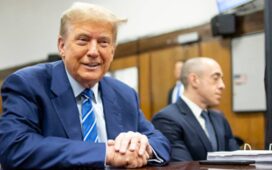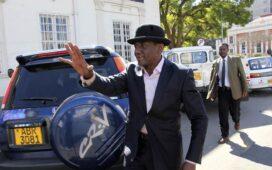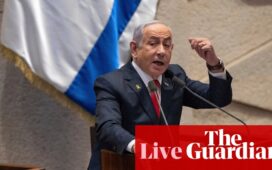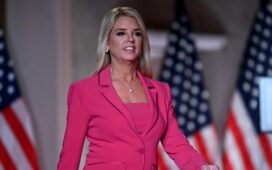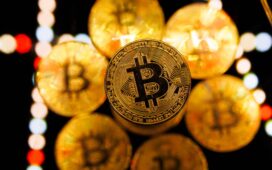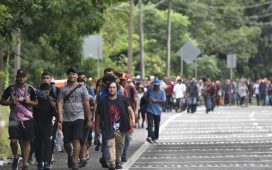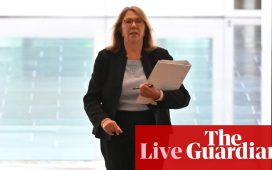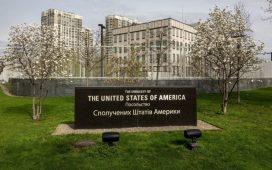For much of Donald Trump’s time in office, the Russia investigation led by Robert Mueller hung over the White House, imperilling his presidency. According to a new account by one of Mr Mueller’s top deputies, the feeling that a hammer might fall at any moment was mutual.
Mr Trump’s denunciations of Mr Mueller’s special counsel probe, his unsubtle talk of pardons and his labelling of one witness as a “rat” all broke norms of behaviour for US presidents.
But they successfully deterred both witnesses and the crack team of investigators responsible for uncovering the truth about Russia’s role in Mr Trump’s shock victory in 2016, according to Andrew Weissmann, who led one of the three teams in the special counsel’s office.
In that sense, Mr Trump’s public belligerence towards the Russia probe — which came after a period of initial restraint — proved an effective strategy, he noted.
“I am not somebody who ascribes to the theory that the president . . . is not smart,” said Mr Weissmann in an interview with the Financial Times. “I think he’s wily, and he certainly is wily with respect to legal matters . . . and he’s bold in terms of what he does.”
Mr Trump has continued to fight those battles, a year and a half after the close of the probe. With just weeks until the 2020 general election, Mr Trump in recent days has demanded indictments of his political opponents, including his rival for the presidency, Joe Biden, for what he has labelled the “treasonous plot” of the Russia investigation.
For Mr Weissmann, it is evidence of the fleeting impact of the special counsel’s office. After Mr Mueller came the investigation of the investigators, driven by William Barr, Mr Trump’s attorney-general, and the president’s alleged effort to pressure Ukraine into aiding his re-election effort, for which he was impeached but acquitted.
“I think [Trump’s] view is that the guardrails are not there,” said Mr Weissmann.
He is the first of Mr Mueller’s prosecutors to speak publicly about the investigation that transfixed Washington for almost two years. His book about the probe, published last week, has offered a vivid inside view of the special counsel’s office.
It has also provided an unvarnished, at times searing, assessment of what Mr Weissman describes as the investigation’s failings, including the punches pulled for fear that Mr Trump might fire them at last.
Mr Weissmann criticises Mr Mueller over a trio of issues: failing to subpoena Mr Trump for an interview; declining to make a conclusion as to whether or not Mr Trump obstructed justice, and not pursuing an investigation of Mr Trump’s financial links with Russia.
The portrait stands in contrast to the public speculation about Mr Mueller’s investigation while it was active: rather than leaving no stone unturned, the special counsel team declined even to ask for an interview with Ivanka Trump, Mr Weissman recounts, though she played an active role in her father’s business, campaign and administration.
Such a move, lawyers in the office feared, “would play badly to the already antagonistic rightwing press . . . and risk enraging Trump, provoking him to shut down the Special Counsel’s Office once and for all,” Mr Weissmann writes.
The book, named Where Law Ends, a reference to the John Locke quote that finishes “Tyranny Begins”, drew a rare public rebuke from Mr Mueller, who said in a statement last week: “It is not surprising that members of the Special Counsel’s Office did not always agree, but it is disappointing to hear criticism of our team based on incomplete information.”
An aggressive prosecutor with a skill for flipping defendants, Mr Weissmann was dubbed “Mueller’s pit-bull” when he joined the special counsel’s office. He headed up “Team M”, which was responsible for investigating Paul Manafort, the Trump campaign chairman whose links to Russian and Ukrainian oligarchs made him an obvious area of focus.
In past assignments, Mr Weissmann had successfully flipped infamous mob figures in New York and infamous corporate crooks at Enron. But in the Russia probe, Mr Trump’s “dangling” of pardons successfully thwarted efforts to get the full truth out of Mr Manafort, even as he faced years in jail for bank and tax fraud, Mr Weissmann said.
The prosecutors in the special counsel’s office adopted a type of gallows humour about these obstacles — the fear of another Saturday Night Massacre, the “gravitational pull” of Mr Trump’s pardon power. Mr Weissmann recounts one prosecutor exclaiming “Pardon Me! Pardon Me!” whenever he encountered the Manafort team in the hallways of the office.
But he also describes an anxiety that undermined the office’s investigation. “For 22 months, we were constantly living under this [feeling of] ‘Are we going to be employed the next day?’,” he said.
The book’s toughest criticisms are levelled at Aaron Zebley, Mr Mueller’s chief of staff, who Mr Weissmann records repeatedly seeking to limit the investigation for fear of Mr Trump’s reaction. He labels Mr Zebley a “timorous” George McClellan, the civil war general who had a reputation for being insufficiently aggressive on the battlefield.
“My deputy, Aaron Zebley, was privy to the full scope of the investigation and all that was at issue,” Mr Mueller said in his statement last week. “He was an invaluable and trusted counsellor to me from start to finish.”
Mr Weissmann admits some unease in publicly criticising his colleagues. He had worked under Mr Mueller previously — he had been FBI general counsel when Mr Mueller was the director. Mr Zebley had been FBI chief of staff.
“I didn’t want to write an easy book that just said everything we did was right,” he said. Once he had decided to write a full account of his experiences, “it was my obligation to say what I thought”, he added.
Mr Mueller’s lengthy final report — described as a “turgid legal document” in Mr Weissmann’s book — detailed contacts between Russians and the Trump campaign but alleged no criminal conspiracy between the two camps to interfere in the election.
It also laid out alleged instances where Mr Trump sought to obstruct the investigation, but did not state whether they were criminal or not. Mr Mueller reasoned that because Mr Trump could not be indicted while in office, it was unfair to accuse him of a crime.
Mr Weissmann in his book describes this as a “transparent shell game” — where they did not have proof of a crime, they said so, but where they did, the report remains silent.
The special counsel’s investigation has long since wrapped up, and its work has been steadily undone by Mr Barr, the attorney-general who has shared the view of Mr Trump that the real scandal of the Russia probe was the investigation itself.
For Mr Weissmann, a registered Democrat and outspoken critic of Mr Trump, questions still remain. He calls the failure to delve into Mr Trump’s financial ties with Russia a “missed opportunity” and describes Mr Manafort as a central enigma.
Among the enduring mysteries is an August 2, 2016, meeting between Mr Manafort and Konstantin Kilimnik, a longtime business associate who was identified as an active Russian spy in a recent bipartisan Senate intelligence report.
Mr Kilimnik had flown to New York from Moscow to make an extraordinary request in the middle of the presidential campaign: that Mr Trump give a green light for Vladimir Putin to effectively take over the eastern half of Ukraine, Mr Weissmann recounts.
“If you want that . . . what are you offering,” Mr Weissmann asks. “We know the quid, but we don’t know the quo.”


